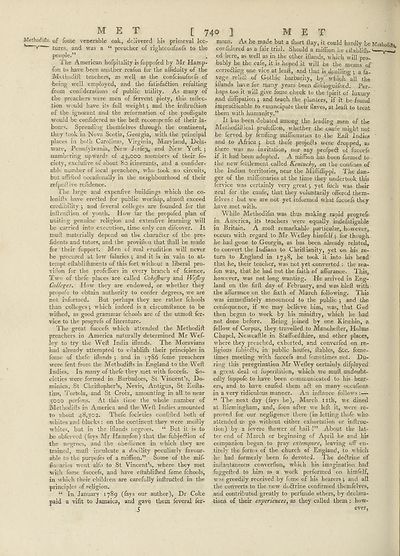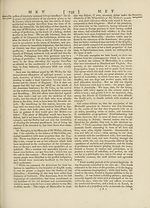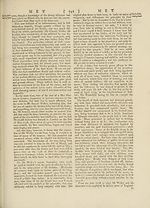Encyclopaedia Britannica, or, a Dictionary of arts, sciences, and miscellaneous literature : enlarged and improved. Illustrated with nearly six hundred engravings > Volume 13, MAT-MIC
(786) Page 740
Download files
Complete book:
Individual page:
Thumbnail gallery: Grid view | List view

M E T [ 740 ] MET
Methodiftn. of ibme venerable oak, delivered his primeval lec-
tures, and was a “ preacher of righteoufnefs to the
people.”
The American hofpitality is fuppofed by Mr Hamp-
fon to have been another reafon for the alliduity of the
Methodift teachers, as well as the confcioufnefe of
being well employed, and the faiisfaction refuiting
from conilderations of public utility. As many of
the preachers were men of fervent piety, this reflec¬
tion would have its full weight 5 and the inftruftion
of the ignorant and the reformation of the profligate
Avouid be confidered as the belt recompenfe of their la¬
bours. Spreading themfelves through the continent,
they took in Nova Scotia, Georgia, with the principal
places in both Carolinas, Virginia, Maryland, Dela¬
ware, Penufylvania, New Jeriej\, and New York ;
numbering upwards of 43,000 members of their fo-
ciety, excluiive of about 80 itinerants, and a conlider-
able number of local preachers, who took no circuits,
but aflifted oceaiionally in the neighbourhood of their
refpeflive refidence.
The large and expenfive buildings which the co-
lonifts have erefted for public worfhip, almoft exceed
credibility j and feveral colleges are founded for the
inilruclion of youth. How far the propofed plan of
uniting genuine religion and extenfive learning will
be carried into execution, time only can difeover. It
mull: materially depend on the character of the pre-
fidents and tutors, and the provifion that lhall be made
for their fupport. Men of real erudition will never
be procured at low falaries •, and it is in vain to at¬
tempt eltablifhments of this fort without a liberal pro-
adium for the profeffors in every branch of fcience.
Two of thefe places are called Coiejbury and Wefley
Colleges. How they are endoaved, or whether they
propofe to obtain authority to confer degrees, ave are
not informed. But perhaps they are rather fchools
than colleges 5 which indeed is a circumftance to be
Aviihed, as good grammar fchools are of the utmolt fer-
vice to the progrefs of literature.
The great fuccefs avhich attended the Methodift
preachers in America naturally determined Mr Wef¬
ley to try the Weft India iflands. The Moravians
had already attempted to eilablifti their principles in
feme of thefe iflands; and in 1786 fome preachers
were fent from the Methodifts in England to the Weft
Indies. In many of thefe they met with fuccefs. So¬
cieties were formed in Barbadoes, St Vincent’s, Do¬
minica, St Chriftopher’s, Nevis, Antigua, St Eufta-
tius, Tortola, and St Croix, amounting in all to near
5000 perfons. At this time the avbole number of
Methodifts in America and the Weft Indies amounted
to about 48,302. Thefe focieties confifted both of
whites and blacks: on the continent they were moftly
whites, but in the iflands negroes. “ But it is to
be obferved (fays Mr Hampton) that the fubjeftion of
the negroes, and the obedience in avhich they are
trained, muft inculcate a docility peculiarly favour¬
able to the purpofes of a million.” Some of the mif-
fionaries went alfo to St Vincent’s, where they met
with fome fuccefs, and have eftablilhed fome fchools,
in which their children are carefully inftrudted in the
principles of religion.
“ In January 1789 (fays our author), Dr Coke
paid a vifit to Jamaica, and gave them feveral fer-
5
mons. As he made but a ftiort flay, it could hardly be It
confidered as a fair trial. Should a million be tilablilh-
ed here, as well as m the other illands, avhich avill pro¬
bably be the cafe, it is hoped it avill be the means of
eorre&ing one vice at leaft, and that is duelling ; a fa-
yage relic! of Gothic barbarity, by avhich' all the
illands have for many years been dittinguilhed. Per¬
haps too it avill give fome check to the ipirit of luxury
and diffipation; and teach the planters, if it be found
impratlicable to emancipate their Haves, at leaft to treat
them with humanity.”
It has been debated among the leading men of the
Methodiftical profeffion, whether the caufe might not
be lerved by fending miffionaries to the Eaft Indies
and to Africa ; but thefe projects were dropped, as
there was no invitation, nor any profpedt of fuccefs
if it had been adopted. A miflion has been formed to
the new fettlement called Kentucky, on the confines of
the Indian territories, near the Mifliflippi. The dan¬
ger of the miflionaries at the time they undertook this
fervice avas certainly very great; yet fuch avas their
zeal for the cauie, that they voluntarily offered them¬
felves : but we are not yet informed what fucoefs they
have met avith.
While Methodifm avas thus making rapid progref
in America, its teachers were equally indefatigable
in Britain. A moft remarkable particular, however,
occurs with regard to Mr Wefley himfelf; for though
he had gone to Georgia, as has been already related,
to convert the Indians to Chriftianity, yet on his re¬
turn to England in 1738, he took it into bis head
that he, their teacher, avas not yet converted : the rea¬
fon was, that he had not the faith of affurance. This,
however, was not long wanting. He arrived in Eng¬
land on the firft day of February, and was bleft avith
the affurance on the fixth of March following. This
avas immediately announced to the public ; and the
confequence, if we may believe him, was, that God
then began to work by his miniftry, which he had
not done before. Being joined by one Kinchin, a
fellow of Corpus, they travelled to Manohefter, Holms
Chapel, Newcaftle in Staffordflnre, and other places,
where they preached, exhorted, and converfed on re¬
ligious fubje£ts, in public houfes, flables, &c. fome-
times meeting with fuecefs and fometimes not. Du¬
ring this peregrination Mr Wefley certainly difplayed
a great deal of fuperftition, avhich ave muft undoubt¬
edly fuppofe to have been communicated to his hear¬
ers, and to have caufed them aft on many oecaflons
in a very ridiculous manner. An inftance follows :—-
“ The next day (fays he), March nth, ave dined
at Birmingham, and, foon after we left it, were re¬
proved for our negligence there (in letting thofe who
attended m go without either exhortation or inftruc-
tion) by a fevere fhewer of hail !” About the lat¬
ter end of March or beginning of April he and his
companion began to pray extempore, leaving off en¬
tirely the forms of the church of England, to which
he had formerly been fo devoted. The dodlrine of
inftantaneous converfion, which his imagination had
fuggefted to him as a work performed on himfelf,
avas greediiy received by fome of his hearers ; and all
the converts to the new dodtrine confirmed themfelves,
and contributed greatly to perfuade others, by declara¬
tions of their experiences, as they called them : how¬
ever,
Methodiftn. of ibme venerable oak, delivered his primeval lec-
tures, and was a “ preacher of righteoufnefs to the
people.”
The American hofpitality is fuppofed by Mr Hamp-
fon to have been another reafon for the alliduity of the
Methodift teachers, as well as the confcioufnefe of
being well employed, and the faiisfaction refuiting
from conilderations of public utility. As many of
the preachers were men of fervent piety, this reflec¬
tion would have its full weight 5 and the inftruftion
of the ignorant and the reformation of the profligate
Avouid be confidered as the belt recompenfe of their la¬
bours. Spreading themfelves through the continent,
they took in Nova Scotia, Georgia, with the principal
places in both Carolinas, Virginia, Maryland, Dela¬
ware, Penufylvania, New Jeriej\, and New York ;
numbering upwards of 43,000 members of their fo-
ciety, excluiive of about 80 itinerants, and a conlider-
able number of local preachers, who took no circuits,
but aflifted oceaiionally in the neighbourhood of their
refpeflive refidence.
The large and expenfive buildings which the co-
lonifts have erefted for public worfhip, almoft exceed
credibility j and feveral colleges are founded for the
inilruclion of youth. How far the propofed plan of
uniting genuine religion and extenfive learning will
be carried into execution, time only can difeover. It
mull: materially depend on the character of the pre-
fidents and tutors, and the provifion that lhall be made
for their fupport. Men of real erudition will never
be procured at low falaries •, and it is in vain to at¬
tempt eltablifhments of this fort without a liberal pro-
adium for the profeffors in every branch of fcience.
Two of thefe places are called Coiejbury and Wefley
Colleges. How they are endoaved, or whether they
propofe to obtain authority to confer degrees, ave are
not informed. But perhaps they are rather fchools
than colleges 5 which indeed is a circumftance to be
Aviihed, as good grammar fchools are of the utmolt fer-
vice to the progrefs of literature.
The great fuccefs avhich attended the Methodift
preachers in America naturally determined Mr Wef¬
ley to try the Weft India iflands. The Moravians
had already attempted to eilablifti their principles in
feme of thefe iflands; and in 1786 fome preachers
were fent from the Methodifts in England to the Weft
Indies. In many of thefe they met with fuccefs. So¬
cieties were formed in Barbadoes, St Vincent’s, Do¬
minica, St Chriftopher’s, Nevis, Antigua, St Eufta-
tius, Tortola, and St Croix, amounting in all to near
5000 perfons. At this time the avbole number of
Methodifts in America and the Weft Indies amounted
to about 48,302. Thefe focieties confifted both of
whites and blacks: on the continent they were moftly
whites, but in the iflands negroes. “ But it is to
be obferved (fays Mr Hampton) that the fubjeftion of
the negroes, and the obedience in avhich they are
trained, muft inculcate a docility peculiarly favour¬
able to the purpofes of a million.” Some of the mif-
fionaries went alfo to St Vincent’s, where they met
with fome fuccefs, and have eftablilhed fome fchools,
in which their children are carefully inftrudted in the
principles of religion.
“ In January 1789 (fays our author), Dr Coke
paid a vifit to Jamaica, and gave them feveral fer-
5
mons. As he made but a ftiort flay, it could hardly be It
confidered as a fair trial. Should a million be tilablilh-
ed here, as well as m the other illands, avhich avill pro¬
bably be the cafe, it is hoped it avill be the means of
eorre&ing one vice at leaft, and that is duelling ; a fa-
yage relic! of Gothic barbarity, by avhich' all the
illands have for many years been dittinguilhed. Per¬
haps too it avill give fome check to the ipirit of luxury
and diffipation; and teach the planters, if it be found
impratlicable to emancipate their Haves, at leaft to treat
them with humanity.”
It has been debated among the leading men of the
Methodiftical profeffion, whether the caufe might not
be lerved by fending miffionaries to the Eaft Indies
and to Africa ; but thefe projects were dropped, as
there was no invitation, nor any profpedt of fuccefs
if it had been adopted. A miflion has been formed to
the new fettlement called Kentucky, on the confines of
the Indian territories, near the Mifliflippi. The dan¬
ger of the miflionaries at the time they undertook this
fervice avas certainly very great; yet fuch avas their
zeal for the cauie, that they voluntarily offered them¬
felves : but we are not yet informed what fucoefs they
have met avith.
While Methodifm avas thus making rapid progref
in America, its teachers were equally indefatigable
in Britain. A moft remarkable particular, however,
occurs with regard to Mr Wefley himfelf; for though
he had gone to Georgia, as has been already related,
to convert the Indians to Chriftianity, yet on his re¬
turn to England in 1738, he took it into bis head
that he, their teacher, avas not yet converted : the rea¬
fon was, that he had not the faith of affurance. This,
however, was not long wanting. He arrived in Eng¬
land on the firft day of February, and was bleft avith
the affurance on the fixth of March following. This
avas immediately announced to the public ; and the
confequence, if we may believe him, was, that God
then began to work by his miniftry, which he had
not done before. Being joined by one Kinchin, a
fellow of Corpus, they travelled to Manohefter, Holms
Chapel, Newcaftle in Staffordflnre, and other places,
where they preached, exhorted, and converfed on re¬
ligious fubje£ts, in public houfes, flables, &c. fome-
times meeting with fuecefs and fometimes not. Du¬
ring this peregrination Mr Wefley certainly difplayed
a great deal of fuperftition, avhich ave muft undoubt¬
edly fuppofe to have been communicated to his hear¬
ers, and to have caufed them aft on many oecaflons
in a very ridiculous manner. An inftance follows :—-
“ The next day (fays he), March nth, ave dined
at Birmingham, and, foon after we left it, were re¬
proved for our negligence there (in letting thofe who
attended m go without either exhortation or inftruc-
tion) by a fevere fhewer of hail !” About the lat¬
ter end of March or beginning of April he and his
companion began to pray extempore, leaving off en¬
tirely the forms of the church of England, to which
he had formerly been fo devoted. The dodlrine of
inftantaneous converfion, which his imagination had
fuggefted to him as a work performed on himfelf,
avas greediiy received by fome of his hearers ; and all
the converts to the new dodtrine confirmed themfelves,
and contributed greatly to perfuade others, by declara¬
tions of their experiences, as they called them : how¬
ever,
Set display mode to:
![]() Universal Viewer |
Universal Viewer | ![]() Mirador |
Large image | Transcription
Mirador |
Large image | Transcription
Images and transcriptions on this page, including medium image downloads, may be used under the Creative Commons Attribution 4.0 International Licence unless otherwise stated. ![]()
| Permanent URL | https://digital.nls.uk/192694268 |
|---|
| Attribution and copyright: |
|
|---|
| Description | Ten editions of 'Encyclopaedia Britannica', issued from 1768-1903, in 231 volumes. Originally issued in 100 weekly parts (3 volumes) between 1768 and 1771 by publishers: Colin Macfarquhar and Andrew Bell (Edinburgh); editor: William Smellie: engraver: Andrew Bell. Expanded editions in the 19th century featured more volumes and contributions from leading experts in their fields. Managed and published in Edinburgh up to the 9th edition (25 volumes, from 1875-1889); the 10th edition (1902-1903) re-issued the 9th edition, with 11 supplementary volumes. |
|---|---|
| Additional NLS resources: |
|

